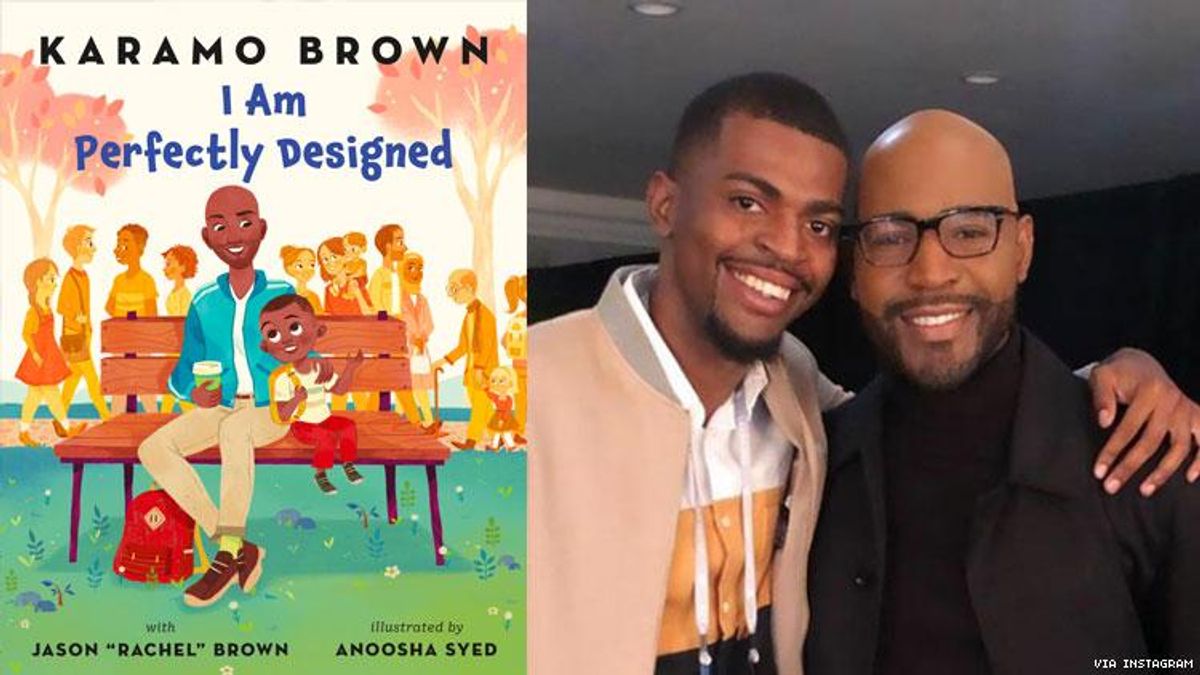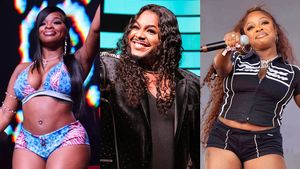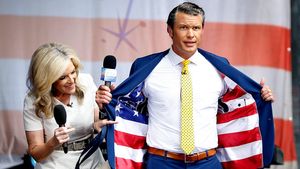The multi-hyphenate Karamo Brown is adding another title to his docket.
He's already a "TV star" -- most recently on Netflix'sQueer Eye, and before that Real World: Philadelphia where he was the first openly gay Black man on reality television. Brown has also been a "social worker," "speaker," "activist," and "memoirist" of his self-titled book. Now Brown will add "children's author" to his CV.
The book, I Am Perfectly Designed, out November 5, was co-written with his son Jason "Rachel" Brown and illustrated by the amazing Anoosha Syed. But their story is everything but average. Karamo didn't know he had a son until Jason was 10, finding out from an envelope at his doorstep subpoenaing him for $230,000 in back child support. This prompted Karamo to fly to Houston where his son lived so they could start their relationship before the Queer Eye host eventually sought full custody.
The story of the book is meant to empower stories like theirs, who some might deem as "abnormal," following a father and his son in an empowering ode to modern families, particularly those with LGBTQ+ parents. In an exclusive conversation, we chatted with Jason and Karamo about the process of writing the book, why it's important in Trump's America, and what it was like to meet for the first time.
We're very excited to announce I'm Perfectly Designed. Why did you decide to write this book together?
Karamo Brown: When I became a father, I was really trying to instill in him the confidence that he can be whatever he is, no matter what people told him. People would make him feel like he wasn't good enough. I tried to consistently instill that he was. And as he's grown up now and turned into one of the most exceptional people I know, I decided that there should be a way of passing on this sort of lesson that I gave to him in a new way. So we decided to do a book together -- a children's book that could be utilized for parents, for kids, and for anyone really who just needs that boost in confidence that they are enough and that they are perfectly designed.
Jason Brown: When we first met each other [my dad] was very big on me being very confident with myself, so, this is just a perfect lesson. When he presented the idea to me, we knew that it would really resonate with everyone.
What was it like, Jason, meeting your dad for the first time?
JB: Meeting my dad was one of the most surreal moments of my life. As a kid, I saw him onReal World. So I was like, "This celebrity can't be my dad." Then we finally meet each other -- you would think that I would be the most excited, but I was actually the most nervous out of my siblings and family members. It was an instant connection we felt. A huge, huge part of a hole -- what was missing from my dad -- was filled up that night and throughout the years.
And Karamo, I know that finding out you had a son was an overwhelmingly positive thing, but also that there were mixed emotions.
KB: As human beings, we are all happy, we're sad, we're scared, we're full of anxiety -- all of this at the same moment. And that's what it was for me. I was like, "I'm happy about this," but also, "I'm scared," and my big fear was, "Will I have the tools to be able to show him that he is great? And that he could have a great life?" And being someone who was young at the time, I'm like, "I don't even know if I'm ready yet." And so we went on this journey of discovery, of our own self-esteem and self-worth, together. I was learning more about how to love myself and loving every part of my perfect design as I was teaching him. And that's scary! Especially if we're talking about LGBTQ+ parents, we don't have a lot of role models. So then we're like, "How do I navigate the fact that I'm still dealing with all the stresses of the world just for being who I am, but now I have to teach this young person how to love themselves, and how to navigate those stresses as well?" I think that's really important and big and part of the message [of the book]. Being a gay man walking out in your world, a gay black man, people tell me I'm not enough. And so, I have to then say, "Well how do I did tell my son that he is enough, even though society is telling him his father is not enough?"
In your own words, what is the book about?
KB: "I am perfectly designed" is something I actually said to my son, and it's actually also something that I always believe. Anytime I do a lecture, I'll leave the audience with it. We've all been given every single tool we need to create the life we want. But somewhere along the line, when it comes to friends, family, the narratives we hear from TV, we start to believe that we aren't. And then we start to believe, "Well, I'm alone in this world. I'm not good enough. The job I want, I'll never get love. The happiness I deserve, I will never get." And by remembering this mantra, "I am perfectly designed." It's to remind yourself that you will get all those things, because you have all the tools. The greatest tool we all have is the ability to ask for help.
JB: For me, the biggest thing was just really being yourself. I think that was one thing my dad really, really pushed in me that I literally live through my life nowadays. It's like I wake up and I remember I'm naturally, literally perfect the way I am. And there's nothing that anyone can take from me that can change that.
KB: When I first met [Jason], he would dare to explore skateboarding, he would dare to explore and be curious about fashion. But the people in his neighborhood and the people in his community and certain family members had told him that if wants to try any those things or himself that that would somehow made him not Black enough, or not manly enough. And when I came into his life, I was like "No, don't subscribe to any of that." If you have desire to try something new in fashion or try something new with a hobby, to do anything, it's fine. And that's just the whole deal of this book.
What was the process like, writing about your own lives?
JB: I was extremely proud of my son. He took a big lead in writing the book, making sure that he was using his voice and his experiences to help inspire anyone who's reading this. What I think is really important is that a lot of times we don't see father son relationships reflected in an emotional, loving, manner. It's usually very much this sort of coaching, aggressive behavior. And that's why our relationship very much loving. I give him lots of kisses, lots of hugs. I tell him how great he is, how special he is, breaking down toxic male behaviors that you see, in a children's book. I want little boys to be reading this and whatever adult reading with them to say, "You don't have to subscribe to that thought pattern.
This book is, as you're mentioning, above everything, about self-acceptance. Why was that message important to you?
JB: I think nowadays, a lot of people are lacking self confidence. We have a lot of insecurities -- I know I personally have faced them. With this message, it really just conveys to people everyone's going through this. We just have to really remind ourselves everyday how perfectly designed we are and no one can take that away from you.
How do you think being a dad has helped you in your role on Queer Eye?
KB: My background in social work, plus being a father, has given me a perspective on the fears and anxiety, the hopes, the dreams that it comes with. I mean, you can see it being reflected in the the ways I sit down with people and they start crying immediately. It's because I'm tapping into those fears and anxieties and helping them to understand that they can go through them. And the only reason I know that is not just because I'm professionally trained, but because as a father, I went through it. There were many nights that I would sit in my room and say, "How the hell am I going to make sure that all the bills are paid? That everything that works out? That [Jason] is going to feel loved and safe? There's no way I can do this. There's no way." But yet, there was always a way because, I'm perfect in my design and I knew that. So then I was like, "Okay, the bills will always be paid, they always were," and I want [Jason] to know that Dad will always be home because he will always be loved and safe. So when I talk to my heroes on Queer Eye, I'm like, "Oh, I know what you're feeling. I've been there. And not only have I been there, I'm also trained so now I can help you."
And to that point, on the show, you are kind of the queen of emotional pep talks.
KB: Can we make this the title of the article? "The Queen of Emotional Pep Talks?"
I'll work it into the dek. Your new epithet. But Jason, are you on the receiving end of a lot of pep talks? Do you feel lucky to be getting freeQueer Eye makeovers all the time?
JB: I don't know if "lucky" is the word. [laughs] Because, you know, he's still my dad it's like dad talk at the end of the day. But honestly, I can say that I am super thankful and grateful that he's my father. He instilled so much self-confidence within me every single day. And so, being on the receiving end of that -- they have their moment.
Why do you feel like a story like this, and a story like yours, is one that's particularly important in this political climate?
KB: Well, first of all, we're in a time where we feel very divided. You know, we have leaders who are telling us that if we don't look or sound or act like everyone else, then we don't get the same rights, we don't deserve the same love, we all deserve the same support. And that narrative is hurting so many people because when you see it constantly being told to you on the news. And when we talk about a book like this, you're looking at parenting with many challenges.
JB: I really want people to take away that self confidence is really key. And that remembering who you are will always get you through lot at the end of the day.
Do you have a message for queer and gay parents out there who are raising kids?
KB: My message for queer parents is you are no different than any other parent. The love you give is just as equal as anyone else, no matter what society says. We have to remember there are still foster care agencies that discriminate against LGBT people. They're still, as I said last Friday at Planned Parenthood, doctors, pharmacies that deny services to LGBT parents. And when you say to a parent, "I'm going to deny you access to loving your child, I'm going to deny you access to certain care or education," you have to just remember that your love is just as valid, just as strong. Society will make you think that you're not able to, but you have to remember you are.
JB: For kids, our parents are really out here, going through a lot. Just show your love to your parents. They really do love you. They're out here going through it, and that will make it easier on your parents.
KB: To the young people who are reading this who might have LGBTQ parents, the struggle that we go through is not your struggle. And Jason, when we talked about this many times, I would say that your job is to be a kid and to be happy and to feel loved. If there is a battle that you feel like you're being an attacked or someone is discriminating against you because of your parents, comes to us. We can give you the tools and give you the support. Talk to your parents first so that they can then help you understand what you're feeling, help you understand what's going on in the world.
One more question for Jason. What kind of dad is Karamo. Is he cool dad? Is he a corny joke dad? Is he a dad that's like, super into like grilling?
No, he's definitely not the barbecue dad. Not at all. My dad is the cool dad. I didn't always see that side because I was a little hard-headed and I stressed him out. But, nowadays I'm really, really starting to see how cool my dad really is compared to all my parents.
RELATED | 'Queer Eye's' Karamo Brown Honors Abortion Rights Activist Deja Foxx


















































































